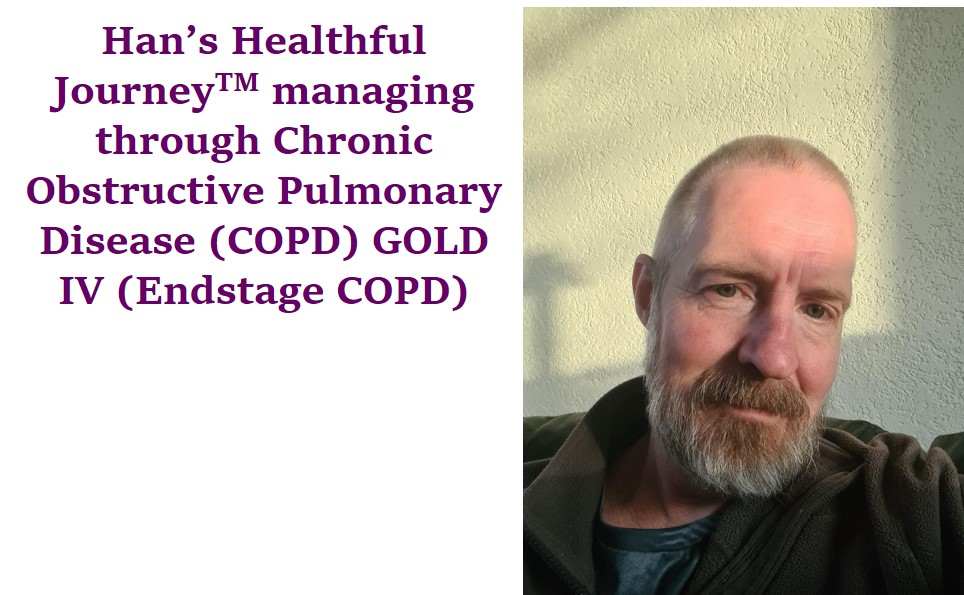My name is Han, I’m Dutch (from the Netherlands), and some twelve years ago, I was officially diagnosed with COPD. By then I’d been having symptoms of shortness of breath for five years or so, but I was maybe a bit in denial, telling myself that those would pass when I finally got round to no longer smoking all of the things I had been smoking.
As you’d probably expected, after I stopped smoking the symptoms didn’t go away and I was told I had COPD, GOLD IV (aka endstage COPD). This kinda surprised me as I didn’t feel all that bad. Sure, I had trouble with stairs and walking for more than a hundred meters, but apart from that..
As such things go, the disease steadily progressed and I lost a lot of weight. I’m 1.78m (5’10”) tall, and started out weighing somewhere around 75kg (165 pounds), rough guestimate, and over a five year period wasted away slimmed down to 57 kg (125 pounds), first slowly and then suddenly fast. I soon needed a stairlift, a mobility scooter, various other adjustments like so I could shower while seated etc. Thank the gods I live in one of those “socialist healthcare utopias”, because I never could have afforded to pay for those myself.
Due to the loss of lean mass and the liberal use of corticosteroids I also developed osteoporosis and one day just plain broke my hip while reaching to get something from the bottom shelf of the fridge. I think that was in 2014?
Even though with nutritional supplements my weight eventually went back up to 72 kg (158 lbs), my health didn’t improve all that much and by the autumn of 2017 I thought I’d maybe seen my last summer. Over the previous years I’d been in and out of the hospital with increasing frequency with pneumonia, pleurisy (inflamed lungs), stays in the ICU, etc. and I had a sneaking suspicion that soon I’d not leave the hospital again. I started low-key giving stuff away to friends, things like paintings, books etc. As one does.
And so in January 2018 I had the mother of all exacerbations, though I obviously didn’t die, or I wouldn’t be writing this. I had some memory loss from hypoxia, had trouble remembering words and in retrospect also had a delirium. I didn’t notice it at the time, because the vivid dreamlike sequences and muddled thinking all seemed to make perfect sense, they were internally consistent.
After my hospital stay I was sent to a rehab facility to get my strength back. I’d again lost quite a bit of muscle mass, needing a walker to get around and 24/7 oxygen or I’d pass out. My trouble with words gradually cleared up, though for the longest time I couldn’t ‘find’ the word anticholinergic (blocking neurotransmitter). Had to get there by way of acetylcholine (a compound throughout the body that acts as a neurotransmitter). So odd.
I don’t know what changed exactly, maybe it was some residual damage from the hypoxia (low oxygen), but where before I’d been kind of apathetic, sad and depressed (probably the systemic inflammation played a role there), this time being on oxygen made me angry. Like hopping mad angry. I really really didn’t like that. I was probably not a nice person to be around. Being tethered to an accumulator, those tubes chafing behind the ears, the way, when showering, water would follow the tubes and get into my nose. I hated every bit of it.
Long story short, it took quite a bit of effort and a lot of pain to wean myself off of the oxygen. The pain was the worst part. What with oxygen flowing freely into the lungs, the auxiliary breathing muscles between the ribs to push the air out again (I have the emphysema subtype of COPD) had slightly atrophied. Giving those a workout meant muscle soreness. I was fine laying down on my side or belly because gravity would assist with squishing the ribcage, but sitting up was very painful. The weeks of unrelenting pain from my abdomen to my shoulders, especially in the back.. ugh! And you aren’t supposed to take a short break, a breather if you like , experts strongly advise against that. You have to keep breathing twenty-four hours a day, every day! Seems like a design flaw, whales can hold their breath for I don’t know how long. SMH (Shaking My Head)
When after four months of rehab I got home, I still had that motivation and started to scour the internet for clues on how to improve my condition. During rehab, on advice of the dietitian, I’d upped my protein intake to 1.5 grams per kilogram of bodyweight. I increased that to two grams and then I stumbled upon information which would turn out to be transformational.
Due to the nature of the subtype of COPD, I don’t have much trouble getting air in, but forcing the air out of the damaged alveoli is a lot harder. Also gas exchange is significantly impaired, making it hard to get rid of CO2. Increased CO2 in the blood leads to breathlessness (and in severe cases confusion, loss of consciousness and then you wake up in the ICU with a machine doing the breathing. One star, would not recommend). This breathlessness obviously lowers exercise tolerance. No one is going to go for a walk around the block if the few steps to the kitchen leave them gasping for air, right?
Then I read about how switching to a high fat low carb diet could reduce CO2 load in patients with COPD. I learned about the Respiratory Exchange Ratio (RER) and this made a lot of sense as I’d noticed decreased breathlessness after drinking alcohol (If I recall correctly, alcohol has an even lower RER than fat). Deriving a large portion of your daily calories from alcohol has certain drawbacks, but I certainly could cut out carbs and replace those with fat.
The decrease in breathlessness was dramatic, making it possible to exercise again. Within weeks I no longer needed the stairlift and was fine with showering and drying myself standing up. Later on, I felt confident enough to return the mobility scooter I had on loan from social services. Still have the stairlift though, it’s very practical for instance when I’m doing the laundry I don’t have to carry the basket down the stairs on my hip like some kind of peasant, no the basket goes on the seat of the lift. Besides, realistically speaking, my condition is bound to deteriorate in the (hopefully distant) future and then I’ll be glad it’s already installed.
I’ve continued tweaking my diet by minimising the intake of pro-inflammatory PUFAs (polyunsaturated fatty acids such as corn oils) and by making meals as low volume, high energy, nutrient dense and easily digestible as possible. So for instance no large salads because leafy greens are relatively high volume, low calorie and low in nutrients and not as easy to digest as, say, meat. Having a full stomach is really uncomfortable when you’re always taking deep breaths. Also, digestion is energy intensive, you can only use each molecule of oxygen once. Whatever you use on digestion is no longer available for other things.
In practice this means a carnivorish diet of fatty beef with low carb dairy like quark, butter, cream and the curds from kefir. I get part of my protein from collagen, ~40 grams daily, because it’s cheap, improves the methionine glycine ratio and it’s supposed to be good for your skin. Corticosteroids destroy connective tissue and I’m way too pretty to get all wrinkly
I eat berries when they’re in season and recently added a breakfast of croissants, though I doubt I’ll keep that. Though tasty, especially with lots of butter, it noticeably increases heart rate and breathlessness which isn’t a nice way to start the day. Still, so tasty!
I supplement with a teaspoon of cod liver oil, salt my food with regular and low sodium salt (gotta get that potassium), cook in tallow (very easy to make from suet), coconut oil and cocoa butter. I also take a high dose of B vitamins because why not, three grams of magnesium malate for ~450 mg of elemental magnesium and some vitamin C. Also creatine because again, why not?
Over the last couple of years the results of the annual pulmonary function tests have steadily improved. If this trend continues I’ll move next year from the very severe category to just regular severe. Having severe emphysema isn’t reason for celebration, but hey.. it’s progress.
I’ve also been able to quit some meds, the theophylline in particular had some gnarly side effects. The only meds I’m currently taking are two inhalers: Spiriva (an anticholinergic) and Seretide (a LABA/ICS combo) for the COPD and alendronic acid once a week, that’s a bisphosphonate and supposed to help with the osteoporosis. Not sure how useful it is, the latest DXA scan showed the osteoporosis had progressed further. Then again, who knows how it would have been if I hadn’t taken it.
At the moment I walk quite a bit, most days I reach my 7,500 steps target, do some modest resistance training when I feel like it and when the weather is nice I go for a long ride on my e-bike. I need less and less assistance from the motor, so maybe soon-ish I can get back to using a regular bike.
This obviously doesn’t mean my daily life isn’t affected. Everything is just a bit harder and I won’t be competing at a track event anytime soon (or ever). But just like a couch potato can, with proper training and diet, run a marathon, I can now walk for surprisingly long stretches. Heart rate somewhere around 125 BPM and an O2 sat (oxygen saturation, a measure of how much oxygen is in the blood) between 93 and 90%. My Fitbit calls it a brisk walk, but at 13 mins per km (around 4.5 kph) on a good day, I’d call it more of an amble. On a bad day it’d take, like, twenty minutes to walk a kilometer and I’d have to call it quits after two kilometers because I’d start to desaturate (= blood oxygen level dropping). The body can compensate remarkably well, but that has its limits.
Fortunately good days outnumber the bad, though a simple cold can have an outsized effect. When I don’t exert myself and am just puttering around the house, cooking, doing the dishes etc, I’m not short of breath at all and my O2 sat is in the normal range (96-99%). Yay! According to again the Fitbit, nocturnal oxygen saturation is between 94 and 97%, though I don’t know how reliable that is compared to a pulse oximeter. And I’ve only been in the hospital once since early 2018 and that was to finally get a hip prothesis fitted.
This brings me to mental resilience. It’s nice to be relatively fit physically, but if you’re down in the dumps mentally, your life still sucks. If after your diagnosis for whatever serious disease you find yourself struggling, that doesn’t mean you’re weak and should grin and bear it, ‘man up’ or whatever other toxic bullshit society’s been feeding us all. No, it means you’re a normal human being who’s going through a life altering experience. If at all possible get yourself some therapy. Grief counseling (yes, it’s okay to grief for the loss of your previous life and for all the things you planned which you’ll now never get to do), cognitive behavioural therapy (I for one found this very helpful), regular psychotherapy, whatever. Do reach out and get help if you’re having a hard time at it. Don’t just talk to your friends and loved ones, talk with them and share what you’re going through. You’re a valuable person, not a burden. Right, this was a public service announcement, back to our regular programming.
Now I’m fully vaccinated and it’s once again safe for me to mingle with my fellow men and women, I’ve started online dating and have applied for volunteer work at a charity giving aid to refugees. I’m optimistic about my future, though unsurprisingly the online dating thing isn’t going all that smoothly. The majority of people nope out once you mention you don’t have a job because you euphemistically have ‘some lung trouble’. Apparently that’s something of a red flag? If somewhere in Holland some nice middle aged single lady is reading this, hit me up. I’m in the Rotterdam area 😀
Anyway, please note that this worked for me and amazingly well too. This might not work (to the same extent) for you. That said, I think most anybody with COPD would do well to adopt a few of the things which I found helpful.
To start, normalise your body weight, for most people that would mean losing a few pounds, for others gaining some healthy weight. The long-term survival sweet spot seems to be a BMI of 23 (it’s one of those J shaped curves). It’s going to take a lot of strength training for me to get there lol, I’m one of those slender speccy types compactly built. I’m no longer slightly pudgy, lost quite a bit of bodyfat but gained not nearly as much lean mass. My weight is currently hoovering around the 65 kg (143 pounds) mark and on average I’m gaining a bit under a pound per month, which is disappointingly slow. Where are those fabled ‘novice gainz’, darnit?!?
Make sure you get enough protein and mix modest cardio with some sort of resistance training. I heartily recommend the exercises found here: https://www.hybridcalisthenics.com/routine because they’re graded, even if you have the physical fitness of a wet dishcloth you can probably still do the easiest ones with proper form. Besides props like a chair, wall, floor, sturdy desk/countertop which you’ll hopefully find in your home, you only need own bodyweight which you always have with you anyway. Convenient!
Lastly limit your intake of omega six poly unsaturated fatty acids (PUFAs) as they’re pro-inflammatory. This is a hard one, because you find those not only in industrial seed oils (corn, canola, sunflower, soy oil etc), but also in almost all processed edible products and, because of what goes into the feed, also in the fat from monogastric animals (pigs, chickens etc. Fun fact: because most humans are too poor to afford more than one stomach, the type of fats they eat decides the fatty acid makeup of their bodyfat). Fortunately ruminants can metabolise those darned PUFAs, so you can eat all of the beef, sheep etc. Maybe limit processed meat as it appears related to adverse outcomes? (Oh noes, no heaping platefuls of bacon every day? Why was I even doing keto again?!?)
Related subreddits: r/ketoscience obv, r/saturatedfat and r/keto though that sub is lousy with CICO and recipes for ersatz foods. In my not so humble opinion, forcibly restricting calorie intake is a fool’s errand. You gotta work with the body, not against it. Protein is the only thing I kinda sorta track. Also, maybe stick to whole foods your great great grandma would have recognised and not make cookies from almond flour sweetened with monkfruit etc, I dunno.
I think the r/zerocarb and r/carnivore subs offer a more healthy and sustainable approach to weight normalisation.




